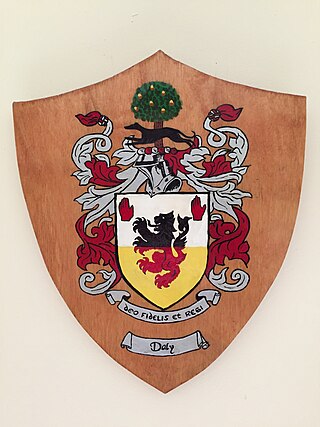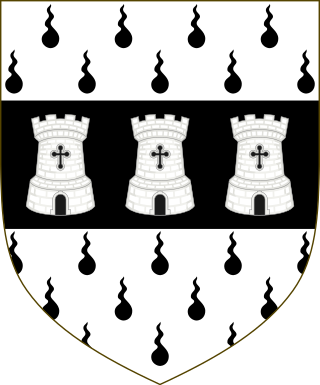Related Research Articles

In Celtic cultures, a bard is an oral repository and professional story teller, verse-maker, music composer, oral historian and genealogist, employed by a patron to commemorate one or more of the patron's ancestors and to praise the patron's own activities.

Irish poetry is poetry written by poets from Ireland, politically the Republic of Ireland and Northern Ireland today. It is mainly written in Irish, though some is in English, Scottish Gaelic and others in Hiberno-Latin. The complex interplay between the two main traditions, and between both of them and other poetries in English and Scottish Gaelic, has produced a body of work that is both rich in variety and difficult to categorise.
The contention of the bards was a literary controversy of early 17th century Gaelic Ireland, lasting from 1616 to 1624, probably peaking in 1617. The principal bardic poets of the country wrote polemical verses against each other and in support of their respective patrons.
Donnchadh Mór Ó Dálaigh was an Irish poet and master of the Irish classical style called Dán Díreach, who died in 1244. Mor is the Irish word for "great".

The Ó Dálaigh were a learned Irish bardic family who first came to prominence early in the 12th century, when Cú Connacht Ó Dálaigh was described as "The first Ollamh of poetry in all Ireland".

Early Modern Irish represented a transition between Middle Irish and Modern Irish. Its literary form, Classical Gaelic, was used in Ireland and Scotland from the 13th to the 18th century.
Giolla Brighde Mac Con Midhe, or Gilbride McNamee was an Irish poet.
Lochlann Óg Ó Dálaigh, early modern Irish poet, fl. ca. 1610.
Dia libh a laochruidh Gaoidhiol is a poem by Aonghas Mac Daighre Uí Dhálaigh. The title can be translated as 'God be with you, O war-band of the Gaels.'
Tadhg Olltach Ó an Cháinte, Irish poet, fl. c. 1601.
Tadhg Dall Ó hUiginn was an Irish poet.
Fearghal Óg Mac an Bhaird was a Gaelic-Irish bardic poet.
Tadg Óg Ó hUiginn was an Irish poet.
Cú Connacht Ua Dálaigh,, died 1139.
Fear Flatha Ó Gnímh was an Irish poet.
Ó hUiginn is the surname of a Gaelic-Irish family of soldiers, poets, and historians located in Connacht. Originally part of the southern Uí Néill based in the Irish midlands, they moved west into Connacht. They were especially associated with what is now County Sligo, settling at Dooghorne, Achonry and Ballynary, as well as other locations in County Mayo, County Roscommon and County Galway. More than half of those bearing the surname in Ireland today still live in Connacht. The name is commonly anglicised as Higgins or O'Higgins.

O'Higgins is an Irish noble family. Its Ballynary line is descended from Shean Duff O'Higgins, Gaelic Baron of Ballynary, who was married to a daughter of the royal family of O'Conor at Ballintuber Castle in Connacht. Shean Duff O'Higgins himself claimed descent from King Niall of Tara. Historically, many of their ancestors were poets and scholars who enjoyed the patronage of several chiefly families including O'Conor Don, MacDermott, O'Doherty, O'Gara, and MacDonagh.
Aonghus Ó Dálaigh was an Irish poet.

Eleanor Marie Knott was an Irish scholar, academic and lexicographer, as well as one of the first women elected to the Royal Irish Academy.
Irish syllabic poetry, also known in its later form as Dán díreach (1200-1600), is the name given to complex syllabic poetry in the Irish language as written by monastic poets from the eighth century on, and later by professional poets in Ireland and Gaelic Scotland.
References
- 1 2 Welch, Robert (1996). The Oxford Companion to Irish Literature (1st ed.). New York: Clarendon Press. p. 33. ISBN 0198661584.
- ↑ Welch, Robert. "bardic poetry". The Concise Oxford Companion to Irish Literature Online. Oxford University Press. Retrieved 8 December 2015.
- 1 2 Bergin, Osborn. Irish Bardic Poetry. Dublin: Dublin Institute for Advanced Studies. pp. 3–5. Retrieved 8 December 2015.
- ↑ Carney, James (1985). Medieval Irish Lyrics with The Irish Bardic Poet. Mountrath: Dolmen Press. pp. 1107–8. ISBN 0-85105-360-2.